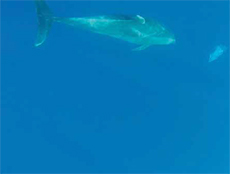




| Home | Features | Club Nights | Underwater Pics | Feedback | Non-Celebrity Diver | Events | 8 August 2025 |
| Blog | Archive | Medical FAQs | Competitions | Travel Offers | The Crew | Contact Us | MDC | LDC |

|

|
 
 |
  ISSUE 23 ARCHIVE - THE ANNUAL TAIJI DOLPHIN SLAUGHTERSunita GargHello, I'm Sunita and I'm 14 years old. I love all animals and want to be a vet when I am older! I became interested in cetaceans and captivity a couple of years ago when I went to SeaWorld and absolutely hated it. Since then I have strongly despised captivity and tried to learn as much about the reality of all the theatrics as I could.Dolphins are possibly the most loved marine mammals in the sea. Thousands of tourists flock from all over the globe to swim with them, in captivity or the wild, or see them in dolphin shows as crude forms of entertainment. However, not many know about some of the horrors of the cetacean captivity industry. One of these horrendous acts is the annual Taiji dolphin slaughter, which takes place every year in Taiji, Japan from the 1st of September and lasts for six months. The annual dolphin slaughter is a horrific truth about the captivity industry. Every year, the dolphins that migrate through Taiji are subjected to the worst torture. Pods of dolphins are corralled by fisherman, who take advantage of the dolphins' echolocation by tapping on the end of long metal rods which they put in the sea while boating around the dolphins. This creates a wall of sound which confuses the dolphins and makes them believe they are swimming into land. Then they are herded into the infamous Taiji Cove where they await their dreadful fate. Over the next few days, the dolphins are kept in pens against the cove, where eventually the best looking and most desirable ones are picked out by trainers. Young calves that were picked are taken away from their mothers and many suffer emotional trauma in the process. Dolphins are highly sentient creatures who can feel emotions and are very smart. Thus the trauma of being ripped away from their families can stay with them forever, and can leave them scarred for life. Next, the dolphins which aren't selected are slaughtered ruthlessly, while all their family can do is watch and wait for their turn. The water in the cove turns red from all the blood during this time. The dolphins are pierced through their blowholes, and some can take up to seven minutes to die. The dead dolphins are then sold for meat, laden full of poisonous mercury and PCB's. This is highly toxic. The other dolphins selected for captivity are transferred to new destinations sometimes thousands of miles away in miniscule crates to spend their lives in a tiny barren tanks performing for tourists. This happens almost every day (if the weather permits it) to up to hundreds of dolphins. Many of the people who allow this horrific act to continue such as the Japanese Government, claim that this is part of an ancient tradition which has been occurring for hundreds of years, but this is false. The drive could not have happened without modern speedboats that have only been around since 1969. This atrocious act continues every year, yet not many people know about it. Not even many people in Japan know about this slaughter, but those who do are now speaking out about it. Although going to marine parks who do not hold cetaceans captured from the wild may seem harmless, the whole captivity industry ultimately helps this practice to continue. New marine parks are always opening up due to the success of pre-existing ones such as SeaWorld, and who may source their animals from this drive. Cetaceans aren't meant to live in tanks. It almost always ends in shortened life spans filled with misery, sugar-coated by greedy corporations who do not care enough about the lives of these amazing creatures. They are highly intelligent and live in social complex structures, and these are very often destroyed in captivity. There is nothing educational about it. Next time you want to buy a ticket for any park which holds captive cetaceans, think about the animals themselves. Is it really worth so many innocent lives just for one photo with a dolphin? Previous article « Dos and Don'ts of Diving in Japan Next article » Dolphin Dilemma Back to Issue 23 Index |